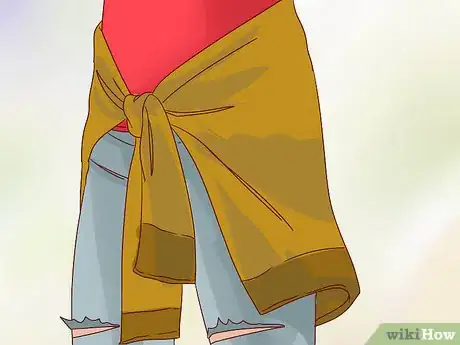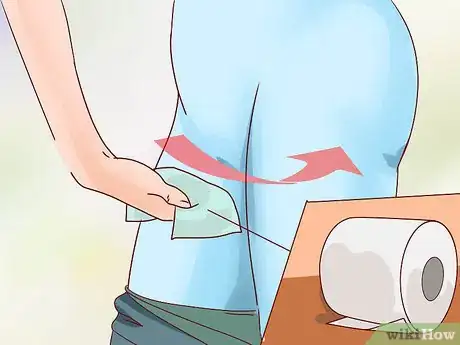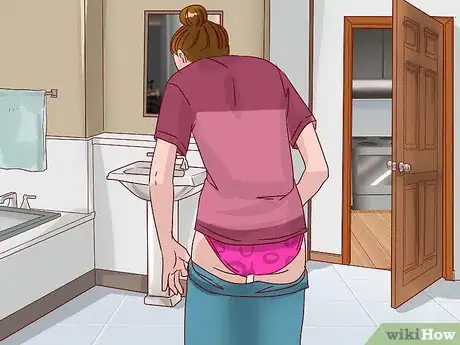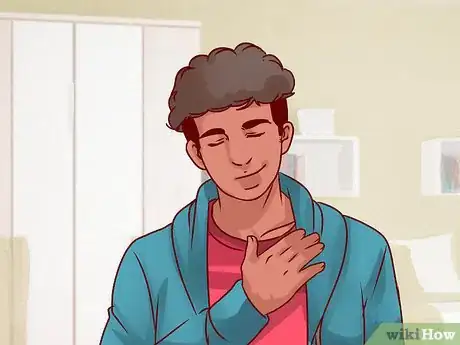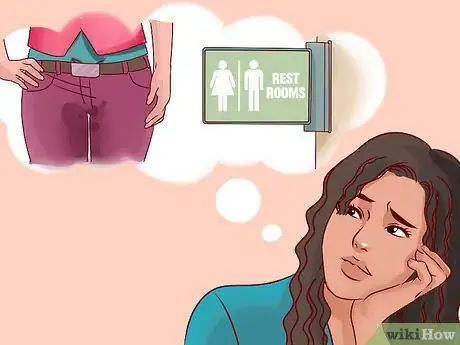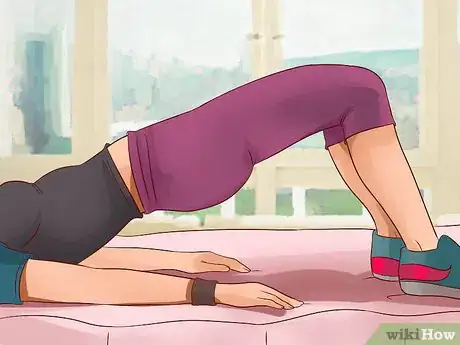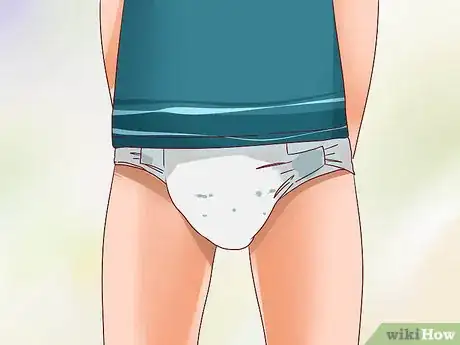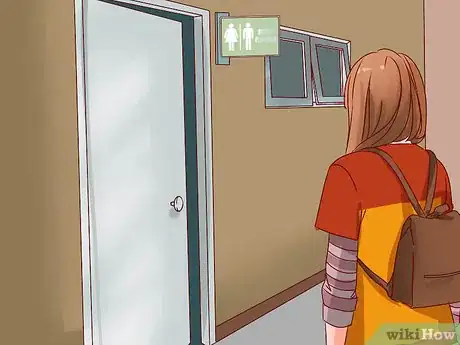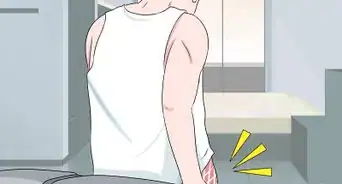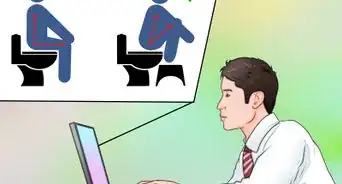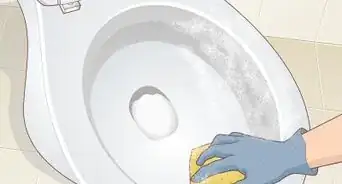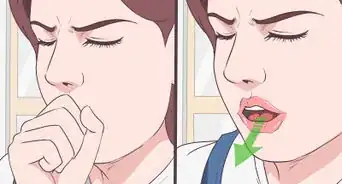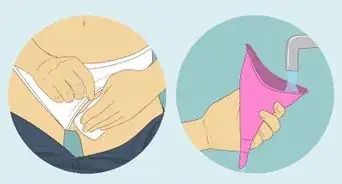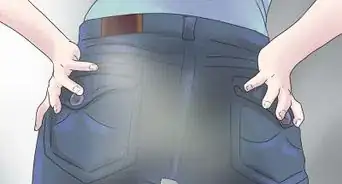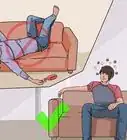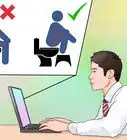This article was co-authored by Allison Romero, PT, DPT. Dr. Allison Romero is a Pelvic Health Specialist, Physical Therapist, and the Owner of Reclaim Pelvic Therapy in the San Francisco Bay Area. With over a decade of experience, Allison specializes in comprehensive pelvic physical therapy treatments for pelvic floor dysfunction. She holds a Bachelor of Science in Kinesiology and Exercise Science from Sonoma State University and a Doctor of Physical Therapy from the University of Southern California. Allison is a board certified Physical Therapist in California and is a member of the American Physical Therapy Association-Section on Women’s Health and the International Pelvic Pain Society.
There are 8 references cited in this article, which can be found at the bottom of the page.
This article has been viewed 155,099 times.
You laugh at someone’s joke and end up peeing in your pants while laughing in public. It’s embarrassing, but it’s happened to a lot of people, right? There’s actually a medical name for the issue: “Stress incontinence.” Luckily, there are ways you can make such a potentially mortifying situation a lot easier.
Steps
Hiding the Evidence from Peeing in Public
-
1Wrap something around your waist. One way to cope with peeing while laughing in public is simply to cover up the evidence. There's a good chance no one will notice, and you'll end up avoiding some humiliation. This might be easier than you think. If you have a sweater, or another longer clothing item, try wrapping it around your waist to hide the urine stain.[1]
- Inspect the damage. If just your crotch area and butt are wet then tying something around your waist should hide the accident. On the other hand, if the pee has ran down your legs you might not be able to hide the accident that easily. If you are wearing a skirt or dress or black pants it's possible that the accident won't be visible in the first place.
- If you have a jacket or a sweater with you, either one would work. Simply tie it around your waist. This will work better with a sweater, because many people tie sweaters around their waists anyways.
- If you don’t have a sweater or jacket handy, you could always buy one if you’re near or in a store. Going to this extent would make the most sense if you’re about to meet someone where you need to make an impression or seem professional.
- You could always ask a friend whether you could borrow a sweater or jacket if you don’t have one along. In fairness, you should be clear about why you need it if you’re borrowing someone else’s garments.
-
2Dry yourself off as best you can. You should make sure that the pee dries, at least somewhat to avoid drawing attention to yourself. You want to get rid of stains and smells. Dampness can also cause skin irritation, so it's vital you clean yourself up after an accident in public.[2]
- Get to a bathroom as soon as you can. You may have to slip into a coffee shop or a grocery store to make use of the public restroom.
- Ideally, you would wipe off your skin with a cotton cloth. From there, you would use moisturizing wipes to wipe off your skin. It's a good idea to put a moisturizing cream on the parts of your skin that got wet, as this can provide a barrier that prevents irritation.
- If you're in a grocery store, or near one, you may be able to quickly purchase these products before slipping into the restroom. However, for the most part, it is unlikely you would be able to wipe up properly. Improvise as best you can. Use toilet paper or paper towels to dry your skin. If you have lotion in your bag, use that for now to provide a barrier. Scented lotion may help cover some of the smell.
Advertisement -
3Change clothes if you can. The most obvious solution is to change your pants, if that’s possible given the situation. If you have a change of clothing nearby, change into it as quickly as possible. One downside to this approach is that you will have to explain your change of dress to colleagues.[3]
- Many people keep workout clothes in their cars, or in a locker at work, if they head to the gym after work. If that attire is appropriate for the occasion, you could retrieve it, and change into shorts or yoga pants.
- If you’re in an area with a lot of clothing stores, you could buy a new pair of pants, and put them on. For example, if you’re in a tourist area, there are likely to be many clothing stores in the near vicinity where you can buy clothing relatively cheaply.
- You could ask to borrow clothes if you are with close friends or a colleague, and that person has workout clothes in the car. If you have a persistent problem with bladder control, you could keep a change of clothing in your car. You can also call someone, like a roommate or spouse, and ask them to bring you a change of clothes.
Reacting the Right Way to Peeing in Public
-
1Stay calm. Remember that this is really not the biggest problem in the world to have. Everything is relative. If a little embarrassment is the worst problem you will ever experience, you’re lucky. If you become flustered and react intensely, this can spur a reaction in others, creating an uncomfortable situation for everyone. Instead, try to keep your cool.[4]
- It’s possible that no one will notice or be able to see anyway. It might feel wet to you, but the pee stain may be barely visible to other people around you because of where it’s located. Try to stay relaxed and slip away.
- If someone does see, remain calm. People often react to embarrassment by becoming flustered, tearful, stuttering, and acting upset overall. This makes the people around you feel awkward as well, causing a tense situation. While it can be incredibly embarrassing to have an accident in public, staying calm can help smooth things over.
- If anyone notices, try to react with a smile and take it with a grain of salt. You can proceed to do things to help quell your embarrassment.
-
2Laugh it off. How you respond to something can affect how other people around you respond to it, so your attitude can make the situation more or less embarrassing. Adopt a confident attitude, and try to laugh off the mistake.
- In hindsight, embarrassing events are easy to laugh off. People often share embarrassing stories at cocktail parties. In the moment, however, laughing can be hard. Try to remind yourself you will live down this moment. This may make you feel more comfortable laughing.
- Even if it feels uncomfortable, try your best to laugh it off. Say something like, “Can you believe I just did that? I guess your joke was really funny.” Speak with confidence, and downplay the significance of what just happened.
- Enlist a friend's help. If you're feeling sensitive, it may be difficult to laugh at yourself. Try to turn to a trusted friend and encourage him or her to laugh with you. Make a joke at your own expense and say, "Am I right?" If your friend joins in, the conversation can go from uncomfortable to fun and lighthearted.
-
3Stay in the present. If you want to overcome embarrassment, work on moving forward. Instead of dwelling on what has just occurred, keep your mind in the present. You peed your pants, and now you must deal. Ruminating on the embarrassment will block your ability to smoothly cope with the situation.
- Try to silence the voice in your head. You may be inclined to think something like, "I can't believe you just did that. How humiliating." Try to ignore the words of self judgment. Instead, focus on what you can do now, in the present, to deal with the situation.
- Keep pulling your attention to the present as need be. Remind yourself you need to get to a bathroom, cover the stain, or laugh it off with those around you.
-
4Spend some time thinking over past embarrassing situations. You may feel you'll never live down peeing yourself in public. However, try to remind yourself of embarrassing things you've done in the past. This is probably not your first cringe-worthy moment. Remembering past embarrassments can help put things in perspective. You never thought you would get over certain fumbles, but eventually you did.
- Go over a list of your most embarrassing moments. Replay that uncomfortable first date, that awkward comment you made in English class, and so on. Try to recall your top five embarrassing moments. Think to yourself, "I got over all of that and I will get over this as well."
- Try to enlist your friends to help. Have friends share embarrassing stories as well. You may feel better about yourself if you realize everyone has experienced embarrassing moments.
Preventing a Reoccurrence
-
1Tighten the pelvic muscles. Many bladder control problems are caused by weak pelvic muscles that have become stretched during childbirth. As a result, the bladder sags and stretches the urethra’s opening. If you believe your bladder control issues are due to childbirth, do Kegel exercises regularly to tighten pelvic muscles.[5]
- To do a Kegel exercise, first identify your pelvic floor muscles by stopping urination in midstream. The muscles you use to do this are your pelvic muscles. Get a sense of what it feels like to move these muscles. Master engaging the pelvic floor muscles through their full range of motion before adding any real exercises.
- Tighten these muscles for five seconds, and then relax them for five seconds. Repeat four or five times in a row. Work up to the point where you are contracting the muscles for 10 seconds at a time.
- Make sure you are not simply contracting your abdomen, thigh, or butt muscles. Try not to hold your breath. Perform the Kegel exercises three times a day, making 10 repetitions at a time.
- Be really careful with holding your urine exercises. Some experts don't recommend doing it repeatedly unless you specifically need to stop your urine for a reason, since you will get a backflow into the urethra that can set you up for some weird urinary patterns, but also for UTIs.
-
2Avoid drinking alcohol or caffeine. These drinks are diuretics, which means that they take fluid from swollen areas of the body and direct it to the bladder. The bladder fills fast, causing it to leak.[6]
- Choose decaffeinated drinks. Drinks with caffeine in them, such as sodas or coffee, will fill the bladder up fast. It’s normal to pass urine every three to four hours, but the urge can be more frequent if you’re drinking large volumes of these beverages.
- Try not to drink a lot of fluids at once if you have this issue. By losing weight, you can also reduce pressure on your bladder. Quitting smoking can also help you control urine leakage, according to some studies.[7]
-
3Wear adult diapers for bladder control. If this is a persistent problem – if you pee frequently when laughing or performing minimal duties – you should see a medical professional to diagnose what’s causing it. Your doctor may suggest adult diapers, and may be able to provide advice on the types to wear. As with anything medical-related, you should see a doctor to make sure that there is no underlying cause that is particularly serious. It’s better to get it checked out than to guess what’s going on.[8]
- If your leaks are usually light, you may be able to get by with a pad or guard over a full on diaper. You can place these items inside regular underwear, and they may make less noise.
- However, if you need a diaper, you can pick a brand that's easier to conceal. Try a variety of brands before deciding on a product that works for you. Experiment with different types of pants and clothing to see what best conceals the diaper.
- Be prepared when wearing a diaper in public. Carry around scented disposable bags you can use to discard wet diapers. If there isn't a garbage can around, a disposable bag can be used to temporarily hold a soiled diaper until you find a place to discard it.
-
4Go to the bathroom frequently. If your bladder is not full, you’re obviously not going to have as much of a problem with peeing in public. Thus, you should make sure you empty your bladder on a regular basis.
- It's more risky to try to hold a full bladder for a long period of time, and if you do so, you will increase the chances of urine leakage.
- Try not to delay trips to the bathroom. Just go, especially if you’ve been drinking a lot of water-based beverages, such as beer, soda, or coffee.
- Before you launch into that funny story, recognize the signs of a full bladder and head to the restroom to empty it out. Try to go to the bathroom at set times and before you actually feel a strong urge to do so, as well.
-
5See a doctor to rule out an underlying medical problem. If you pee simply by laughing, it could indicate an underlying issue. If it happens more than one time, see a doctor. Incontinence can be a sign of a variety of underlying health conditions.
- There is a specific term for this kind of bladder control leakage because it's relatively common. It’s called “stress incontinence. It doesn’t mean that you have emotional stress. It means there is stress placed on the bladder.
- Menopause can also increase urine leakage in women. Damaged nerves can also cause urine leakage as a result of ailments such as a stroke or diabetes. Urine leakage can be caused by trauma, such as pelvic surgery. Being overweight can also effect the bladder.
- Once your doctor has figured out the cause of your incontinence, the two of you can go over a treatment plan. There are a variety of ways, such as medications and lifestyle changes, to treat incontinence and help you better control your bladder.
Community Q&A
-
QuestionHow to stop peeing yourself when your sister is making you laugh?
 Community AnswerTry tightening your pelvic muscles as much as you can while laughing.
Community AnswerTry tightening your pelvic muscles as much as you can while laughing. -
QuestionWhy do you pee while laughing?
 Community AnswerThe problem is likely caused by a full bladder, weak pelvic muscles, or both. There are many causes of weakened pelvic muscles, including nerve damage, childbirth trauma, and weight gain.
Community AnswerThe problem is likely caused by a full bladder, weak pelvic muscles, or both. There are many causes of weakened pelvic muscles, including nerve damage, childbirth trauma, and weight gain. -
QuestionWhy do I sometimes feel like there is more coming out when I am finished peeing?
 Community AnswerYou may have weakened pelvic muscles. This can be caused by many reasons, such as childbirth, and you should see a doctor to check it out.
Community AnswerYou may have weakened pelvic muscles. This can be caused by many reasons, such as childbirth, and you should see a doctor to check it out.
References
- ↑ http://www.34-menopause-symptoms.com/irregular-periods/articles/irregular-periods-addressing-your-wardrobe.htm
- ↑ http://www.nhs.uk/Livewell/incontinence/Pages/Livingwithincontinence.aspx
- ↑ http://kidshealth.org/en/kids/period-school.html#
- ↑ https://www.psychologytoday.com/blog/fulfillment-any-age/201412/the-best-way-deal-embarrassment
- ↑ http://www.mayoclinic.org/healthy-lifestyle/womens-health/in-depth/kegel-exercises/art-20045283
- ↑ http://patient.info/health/urinary-incontinence-leaflet
- ↑ http://www.womenshealth.gov/publications/our-publications/fact-sheet/urinary-incontinence.html
- ↑ http://blog.caregiverpartnership.com/2015/01/how-to-conceal-your-adult-diapers-when.html
